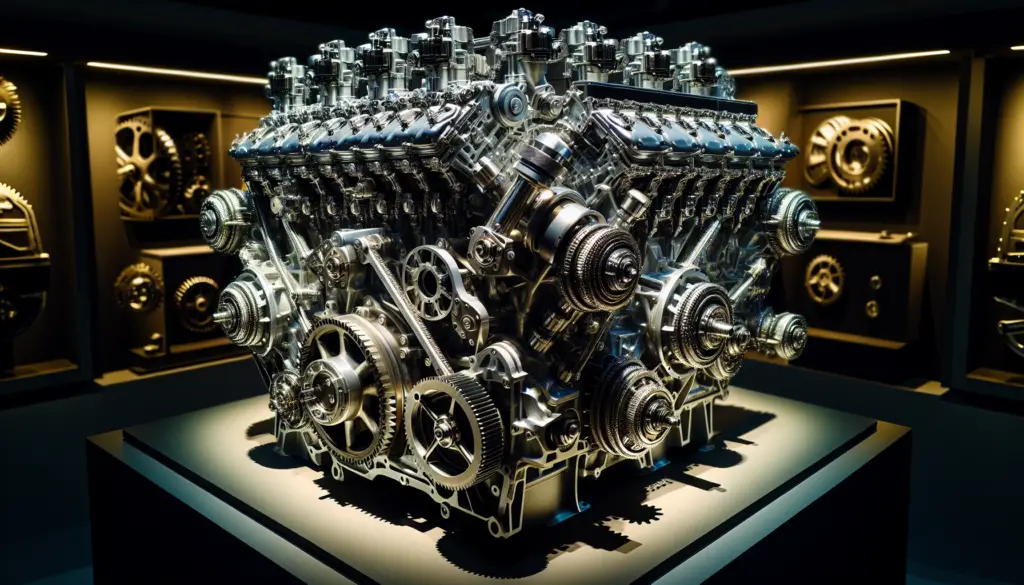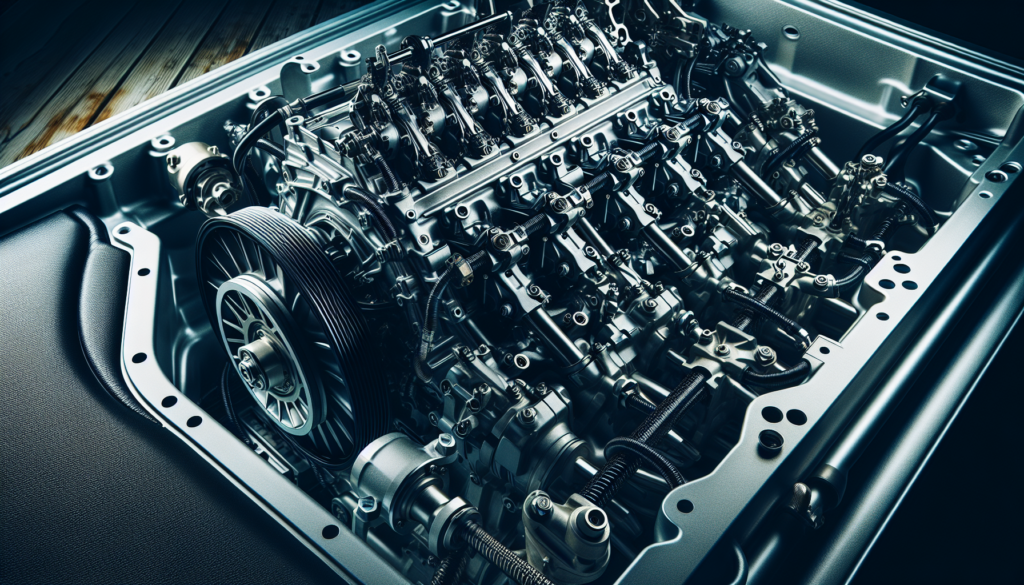Have you ever dreamt of having a boat engine that perfectly matches your unique needs and preferences? If so, it’s important to consider a few key factors before diving into the customization process. From the type of boat you have to the desired performance and fuel efficiency, these factors will help ensure that your customized boat engine not only meets but exceeds your expectations. So, before you set sail on your next adventure, take a moment to explore the crucial elements that will make your boat engine truly your own.

Type of Boat Engine
When customizing your boat engine, the first key factor to consider is the type of engine you want to use. There are several options to choose from, each with its own advantages and disadvantages.
2-stroke Engine
A 2-stroke engine is a lightweight and compact option that delivers high power and acceleration. However, it tends to consume more fuel and emit more emissions compared to other types of engines. It is suitable for smaller boats and those looking for speed and maneuverability.
4-stroke Engine
A 4-stroke engine is known for its fuel efficiency and quieter operation compared to a 2-stroke engine. While it may not provide the same level of acceleration, it offers better torque and is more environmentally friendly. It is suitable for larger boats and those seeking a balance between power and efficiency.
Inboard Engine
An inboard engine is mounted inside the hull of the boat, typically placed in the center. It provides a better weight distribution, making the boat more stable in rough waters. Inboard engines are commonly used in cruising boats and larger vessels.
Outboard Engine
An outboard engine is mounted outside the hull at the stern of the boat. It offers easy maneuverability and accessibility for maintenance and service. Outboard engines are popular for smaller boats and recreational vessels.
Performance Requirements
The performance requirements of your customized boat engine are crucial to achieving the desired functionality and capabilities on the water.
Horsepower
The horsepower of an engine determines its power output and affects the speed and acceleration of the boat. Consider the weight of your boat and the activities you plan to engage in, such as water sports or leisurely cruising, to determine the appropriate horsepower for your engine.
Torque
Torque is the rotational force that allows the boat to move through the water. It is essential for activities such as towing and carrying heavy loads. The higher the torque, the more power your boat will have for these tasks.
Fuel Consumption
Fuel consumption can significantly impact your boating experience and operating costs. Consider the fuel efficiency of the engine you choose to minimize fuel costs and maximize your time on the water.
Speed
The desired speed of your boat should also be taken into account when customizing the engine. If you enjoy high-speed adventures, a more powerful engine may be necessary. However, if you prefer a leisurely pace, a less powerful engine may suffice.
Operating Environment
The operating environment plays a crucial role in the performance and durability of your customized boat engine.
Freshwater
Freshwater environments are generally less corrosive than saltwater environments. Watercraft operating in freshwater require less maintenance and protection against corrosion. However, freshwater engines should still be well-maintained to ensure optimal performance.
Saltwater
Saltwater environments can be harsh on boat engines due to the corrosive nature of salt. When customizing an engine for saltwater use, it is essential to select materials that are resistant to corrosion and to implement regular maintenance practices to prevent saltwater damage.
Brackish Water
Brackish water, a mixture of freshwater and saltwater, presents unique challenges for boat engines. It is essential to choose an engine that can withstand the corrosive elements of saltwater while still performing well in freshwater portions of the environment.
Seasonal Temperature Variations
Seasonal temperature variations can affect the performance of your boat engine. It is crucial to consider the temperature range you will be operating in and choose an engine that can handle the specific conditions. Engines with proper cooling systems and temperature regulation mechanisms are ideal for varying climates.
Engine Weight
The weight of the customized engine has significant implications for the overall performance and stability of your boat.
Weight Distribution
Proper weight distribution is vital for maintaining stability and maneuverability. When customizing your boat engine, consider how the weight of the engine will affect the balance of the boat. Distributing the weight evenly will help ensure a smooth and stable ride.
Boat Stability
The weight of the engine can impact the stability of the boat. Too much weight at the stern can cause the boat to be stern-heavy, affecting its handling and safety. Ensure that the engine weight is appropriate for your boat’s design and size to maintain optimal stability.
Trailer Capacity
The weight of the customized engine should also be considered in relation to the capacity of your boat trailer. Ensure that your trailer can handle the combined weight of the boat, engine, and any additional equipment or accessories to avoid exceeding its capacity.

Compatibility with Boat Design
When customizing your boat engine, it is essential to ensure compatibility with your boat’s design and specifications.
Size and Shape
Consider the size and shape of your boat when selecting an engine. Engines come in various sizes, and choosing one that fits within the available space and matches the aesthetic of your boat is important. Additionally, the engine should be properly sized to ensure optimal performance and efficiency.
Boat Weight and Length
The weight and length of your boat will also impact the engine selection process. Smaller boats may require less powerful engines, while larger boats may need more substantial engines to achieve the desired performance. Additionally, the weight of the boat should be taken into account to ensure the engine can handle the load.
Transom Design
The transom design of your boat, particularly for outboard engines, is critical for proper installation and performance. Ensure that the engine mounting system is compatible with your boat’s transom design to prevent any issues or modifications that may be required.
Fuel Choice
Choosing the right fuel for your customized boat engine is essential for optimal performance and efficiency.
Gasoline
Gasoline is the most common fuel choice for boat engines due to its widespread availability. Gasoline engines are relatively easy to maintain and provide good power output, making them suitable for a range of boating activities.
Diesel
Diesel engines are known for their fuel efficiency and durability. They offer excellent torque and are often preferred for larger vessels and commercial boats. However, diesel engines can be more expensive to purchase and maintain.
Propane
Propane engines are becoming more popular due to their low emissions and environmental benefits. Propane fuel is readily available, and engines powered by propane can provide reliable performance for a variety of boating applications.
Electric
Electric engines are gaining popularity as a green and quiet alternative to traditional fossil fuel engines. They have zero emissions, require minimal maintenance, and provide a smooth and quiet boating experience. However, electric engines typically have limited range and require access to a power source for recharging.

Noise and Vibration Levels
The noise and vibration levels of your customized boat engine can greatly impact your comfort and the environment.
Quiet Operation
Choose an engine that operates quietly to enhance your boating experience and minimize disturbance to other boaters and wildlife. Engines with advanced noise reduction features and technology can significantly reduce noise levels, allowing for peaceful and enjoyable boating.
Cabin Comfort
If your boat has a cabin, consider how the engine noise and vibration may affect comfort while onboard. Vibration isolation systems and noise dampening materials can be added during the customization process to reduce cabin noise and increase overall comfort.
Environmental Impact
Reducing the noise and vibration levels of your customized boat engine can also lessen the environmental impact. Quieter engines help preserve the tranquility of marine environments and minimize disturbance to marine life.
Maintenance and Serviceability
Considering the maintenance and serviceability of your customized boat engine is essential for ensuring its longevity and optimal performance.
Ease of Maintenance
Choose an engine that is easy to maintain to simplify routine upkeep tasks. Engines with accessible components, user-friendly maintenance systems, and clear maintenance guidelines make it easier for you to keep your engine in good working order.
Accessibility of Parts
Ensure that the engine manufacturer provides easy access to genuine parts, either directly or through authorized dealers. Availability of spare parts is essential in case of repairs or replacements, ensuring your engine stays operational without delays.
Manufacturer Support
Select a boat engine from a reputable manufacturer known for providing excellent customer support and technical assistance. Having reliable manufacturer support can be invaluable when encountering issues or seeking professional guidance during the customization process or throughout the engine’s lifespan.

Cost Considerations
Cost is an important factor when customizing your boat engine, and it goes beyond the initial purchase price.
Purchase Price
Consider the initial purchase price of the engine and how it fits within your budget. Compare prices and features among different engine options to find the best balance between cost and performance.
Operating Costs
Operating costs include fuel, maintenance, and potential repairs. Choose an engine that offers good fuel efficiency to minimize ongoing fuel expenses. Additionally, consider the maintenance requirements and potential repair costs associated with each engine option.
Fuel Efficiency
Fuel efficiency is a key factor in determining operating costs. Engines with higher fuel efficiency require less frequent refueling, saving you money in the long run. It is essential to assess the fuel consumption rates of different engines to make an informed decision.
Safety Features
When customizing your boat engine, safety features should not be overlooked. These features can help protect you, your passengers, and your boat in emergency situations.
Emergency Shut-Off Switch
An emergency shut-off switch, also known as a kill switch, is a safety feature that cuts off the engine in case of an emergency. It is typically connected to a lanyard worn by the operator. If the operator falls overboard or is unable to control the boat, the shut-off switch is pulled, instantly stopping the engine.
Fire Suppression System
A fire suppression system is designed to detect and extinguish fires in the engine compartment. It is an essential safety feature to protect against potential engine fires, which can spread rapidly and pose serious risks to the boat and its occupants.
Engine Overheat Protection
Engine overheat protection is crucial to prevent damage to the engine and ensure safe operation. Overheating can be caused by various factors, such as insufficient cooling or prolonged operation at high speeds. An engine equipped with overheat protection features will automatically shut down or provide warnings if the temperature exceeds safe levels.
By considering these key factors when customizing your boat engine, you can ensure that it is tailored to your specific needs, preferences, and operating environment. Take the time to evaluate each factor and choose an engine that delivers excellent performance, reliability, and safety. A well-designed and customized boat engine will enhance your boating experience and provide years of enjoyment on the water.


